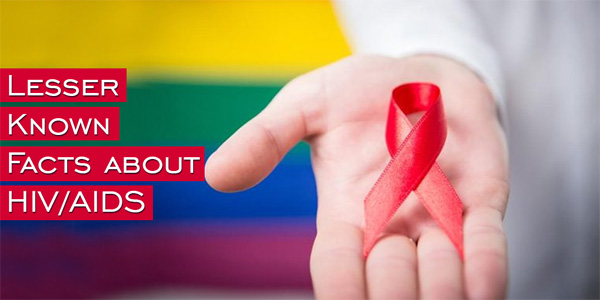It is estimated that approximately 1,400,000 to 1,600,000 people infected with HIV/AIDS currently reside in India. After South Africa and Nigeria, India is believed to harbor maximum number of HIV infected people in the world. Growing concerns on this issue have resulted in many governmental and non-governmental organizations taking drastic steps to increase awareness about this disease but the general public still continues to be largely ignorant.
One of the biggest hurdles in eradicating HIV/AIDS from our country is the stigma associated with it. HIV and AIDS-related stigma has led to discrimination against people living with this disease thereby restricting their access to better healthcare facilities
Hollywood Actor Charlie Sheen recently came out in the open about his HIV infection. It’s about time people let go of the social stigma and speak more openly about this disease in order to reveal its devastating health effects.
Here are a few lesser known facts about HIV/AIDS
- Human Immunodeficiency Virus (HIV) is infact a virus that attacks the immune system and makes the body highly vulnerable to dangerous diseases.
- HIV emerged from Africa and spread across the globe in less than 10 years
- Acquired immune deficiency syndrome (AIDS) is a disease or medical condition which develops when the Human Immunodeficiency Virus has caused a significant amount of damage to a person’s immune system
- HIV/AIDS spreads by having unprotected sex with an infected person, sharing needles or syringes, blood transfusions and from being born to an infected mother. It doesn’t spread by touching, hugging or kissing an infected person.
- It is possible for a person to be infected with HIV and not have AIDS for years. Thanks to constant advancement in medical science, it is now possible to control the growth of HIV. With advanced therapies and specific lifestyle changes, levels of HIV infection can be controlled to a large extent thereby preventing opportunistic infections and a diagnosis of AIDS
- Within 2 to 4 weeks of HIV entering the body, 40% to 90% of people experience flulike symptoms, but sometimes symptoms don’t appear for years. Many people who have HIV don’t even know it because they don’t show any symptoms for years.
- The symptoms for HIV/AIDS can be very deceptive hence one cannot rely solely on symptoms in order to be certain about his/her HIV status. Getting tested is the only way to be sure about the presence of HIV in the body
- Mosquitoes do not transmit or transfer one person’s blood into another person.However they do insert their saliva into their victims which carries a host of fatal illnesses like Dengue, Malaria, Yellow fever etc. HIV virus cannot live inside insects for long enough to be transferred through their saliva
- A simple saliva or blood test is used to diagnose the HIV infection; however, this test only works several weeks after the infection has entered the body.
- AIDS is a condition in which the immune system is affected to a large extent therefore AIDS detection test is conducted by taking a count of the immune cells, called CD4 cells
- Those affected with HIV/AIDS tend to show early signs of ageing mainly as a result of chronic inflammation caused by the virus even during the antiretroviral treatment.
Although HIV and AIDS have become very common it is still surrounded by silence and ignorance. World AIDS Day is a global initiative that encourages communities to take a stand against HIV/AIDS.
Voice your support for people living with this disease and work towards building an AIDS Aware society


